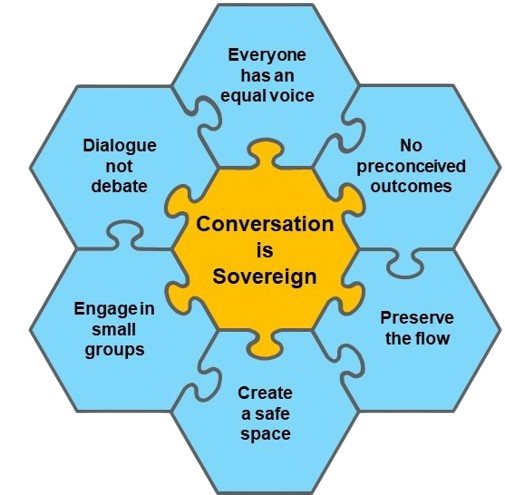Reading Time: < 1 minute
 In a Knowledge Café, all participants are treated equally. No one is given more conversational power than anyone else, and no one’s power is diminished.
In a Knowledge Café, all participants are treated equally. No one is given more conversational power than anyone else, and no one’s power is diminished.
Google Web Search
Principle: Everyone has an equal voice.
 In a Knowledge Café, all participants are treated equally. No one is given more conversational power than anyone else, and no one’s power is diminished.
In a Knowledge Café, all participants are treated equally. No one is given more conversational power than anyone else, and no one’s power is diminished.
In a Knowledge Café, there should be no hierarchy in the room or the small groups.
Now, this is not entirely possible. Whatever you do, there will always be power differences between the participants. You can make them non-explicit, but implicitly, they will always exist.
There should not be any small group hosts or notetakers, and no one should be responsible for reporting what was discussed.
You should also think carefully about who you invite. For example, a dominant senior figure in the room can intimidate many people into silence.
Knowledge Café Principles

- Knowledge Café Principle: Conversation Is Sovereign It's all about the conversation
- Knowledge Café Principle: Everyone Has an Equal Voice Everyone is an equal participant
- Knowledge Café Principle: No Preconceived Outcomes The outcomes are emergent
- Knowledge Café Principle: Preserve the Flow Conversational flow should not be interrupted
- Knowledge Café Principle: Create a Safe Space Where conversation can flourish
- Knowledge Café Principle: Engage in Small Groups Real conversation takes place in small groups
- Knowledge Café Principle: Dialogue Not Debate Be prepared to emerge a slightly different person
Principle: Everyone has an equal voice.
Posts that link to this post
- Knowledge Café: Process How to run a Knowledge Café
POST NAVIGATION
CHAPTER NAVIGATION
SEARCH
Blook SearchGoogle Web Search
This page is part of a blook on Conversational Leadership. Parts of this book have restricted access. You can learn more about the book and how to obtain full access on the home page.
Gurteen Knowledge Letter
The Gurteen Knowledge Letter is a free monthly newsletter with over 20,000 subscribers that I have been publishing by email for over 20 years.
Learn more about the newsletter and register here.
The Gurteen Knowledge Letter is a free monthly newsletter with over 20,000 subscribers that I have been publishing by email for over 20 years.
Learn more about the newsletter and register here.


Hello David, It just so happens that I am thinking and writing a lot about power relating, especially in conversations, at the moment. I was glad to find a tag called ‘power’, as it seems to me that the power process is at the heart of how conversation works.
To my mind it makes sense to try to avoid writing about power as a thing. Even “power differences” is a problematic expression. Whenever we interact with each other, we are negotiating for control of the conversation and what happens after it. Even two ostensibly equal people do this dance. In conversations it can be observed in turn taking, in monologuing, in listening and not listening, in interruptions, silence, opinionated talk, curiosity and inquiry, etc. etc. etc. I’m sure you know all this, but worth mentioning perhaps.
Regards, Alison
Hi Allision,
You have provoked my thinking on “power not being a thing” and I assume you mean it’s a “process”.
I’d love to hear more of your thoughts on the subject :=)
Thanks David
Sorry it has taken me so long to reply. The European heatwave intervened, plus the ephemeral nature of online exchanges.
Anyway, your newsletter prompted me to take another look today and luckily I had a vague memory of having commented on the tag ‘power’!
Yes, I do mean power relating is a process. I studied with Ralph Stacey and co and they taught me to see the human world as in perpetual motion!
Since I last commented, I have written a paper on power (I’ll let you know when it can be shared — have to get some permissions for quotes first). I am also drafting a blog post (and possibly podcast) and will definitely send you the link. Should be within a week.
It might be fun to explore the topic together. Do you remember we once met at a Henley conference where I was talking with Jane Maher and Elizabeth Lank about our work on ‘communities of influence’? You and I meant to stay in touch and your newsletter has allowed me to follow your activities a bit.
Warm regards,
Alison
Would love to see your paper and blog-post Alison. Seeing power as a relating-process sounds a fascinating way to look at it. I am of course familiar with Ralph Stacey’s work. Would be happy to explore together.
Yes, I do recall meeting you at Henley. Must be a good 5 years ago now.